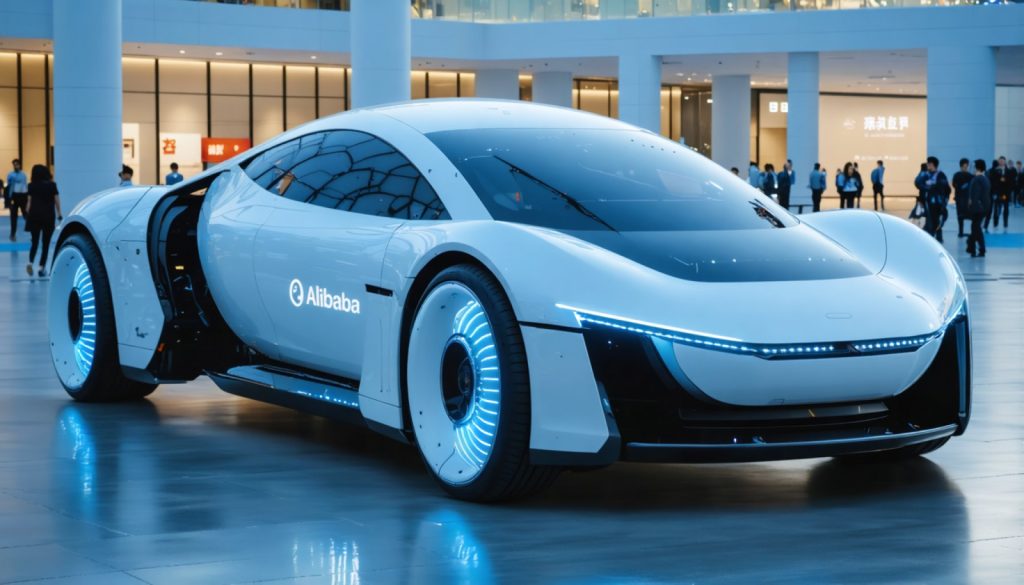
- China’s AI advancements are accelerating, with significant collaborations like Alibaba and BMW shaping the future of automotive technology.
- The partnership focuses on integrating advanced AI capabilities, including voice recognition and smart trip planning, into BMW vehicles for the Chinese market.
- Alibaba is significantly investing in AI infrastructure, strengthening its influence across cloud services, e-commerce, and beyond.
- U.S. semiconductor export restrictions are pushing Chinese firms to optimize algorithms, enhancing competitiveness in the global AI landscape.
- Chinese tech companies are swiftly closing the gap with U.S. AI models, potentially redefining global technological standings.
- The evolving AI landscape is driven by innovation, strategic partnerships, and adaptability, highlighting a future filled with possibilities.
Imagine a world where your car anticipates your every need, navigating seamlessly through traffic while you relax. This futuristic vision edges closer to reality as China’s AI scene surges with unprecedented momentum, nudging the likes of Alibaba and BMW into strategic collaborations.
In a thrilling twist along the tech highway, Alibaba Group Holding Limited has joined forces with BMW, setting the stage for a transformative era in automotive innovation. This alliance is a formidable attempt to weave artificial intelligence seamlessly into the fabric of BMW’s upcoming vehicle models, tailored specifically for the Chinese market. At the heart of this endeavor is Banma, a tech company under Alibaba’s expansive umbrella, which aims to redefine in-car technology by enhancing the AI capabilities within BMW vehicles, particularly focusing on advanced voice recognition and smart trip planning.
The spark of innovation in China doesn’t stop at the steering wheel. Alibaba is orchestrating a grand shift towards intensifying its AI infrastructure investments. As the world watches, the company aligns its strategies to further entrench AI across various domains, ranging from cloud services to e-commerce platforms, reinforcing its global digital prowess.
Across the Pacific, politics and policy skim across the surface like gentle ripples yet manage to create waves that Chinese tech firms must continually navigate. U.S. semiconductor export restrictions, enacted initially under the Biden administration, have applied pressure on Chinese firms, urging them to refine algorithms and optimize resources with impressive results. Some like DeepSeek have astonished industry experts by elevating software engineering efficiencies and challenging the technological status quo.
While U.S. AI models currently maintain an edge in specific tasks, Chinese firms are rapidly closing the gap, leveraging their growing expertise to redefine global standings. As these tech titans race towards the zenith of AI innovation, one critical question remains: which entity will welcome the future first?
Herein lies the takeaway—while the tech frontier remains an arena of rapid shifts, collaborations like that between Alibaba and BMW exemplify a swan dive into the pool of possibilities that AI promises. A precise blend of innovation, adaptation, and strategic partnerships propels this journey, capturing the world’s collective imagination and hinting at a future not just imagined, but driven.
How Alibaba and BMW’s AI Partnership is Pioneering the Future of Automotive Innovation
The collaboration between Alibaba and BMW marks a significant milestone in the evolution of automotive technology, particularly within the Chinese market. As these industry giants join forces, they aim to usher in a new era of cars that are not just modes of transportation but smart companions that cater to passenger needs with sophistication and precision. Here’s a comprehensive dive into what this partnership entails and what it could mean for the future.
Key Aspects of the Alibaba-BMW Collaboration
1. Advanced In-Car Technology:
– Voice Recognition: By integrating advanced voice recognition systems, BMW vehicles will be capable of understanding intricate commands, enhancing driver convenience and safety.
– Smart Trip Planning: This feature will leverage AI to offer real-time navigation advice, predict traffic patterns, and suggest optimal routes, turning commuting into a more efficient experience.
2. Strategic AI Investments by Alibaba:
– Beyond automotive applications, Alibaba is channeling resources into enhancing their AI infrastructure, a move that spans across cloud services, e-commerce, and beyond. This commitment underscores Alibaba’s strategic positioning as a global digital powerhouse.
3. Global and Political Implications:
– Tech Rivalry: The U.S.-China tech rivalry has accelerated innovation as restrictions like semiconductor export limits push Chinese firms to innovate rapidly.
– Algorithm Optimization: Companies like DeepSeek are setting new benchmarks by refining algorithms, demonstrating China’s capacity to advance in AI technology.
How-To Steps & Life Hacks for Maximizing AI in Automotives
– Stay Updated on Software: Regularly update your vehicle’s software to benefit from the latest features and enhancements.
– Customize AI Settings: Adjust the AI settings in your vehicle to suit your preferences, including language and voice recognition nuances.
– Engage with Customer Support: BMW and Alibaba may offer customer support to help users leverage new features, ensuring an optimal driving experience.
Real-World Use Cases
– Efficient Logistics and Fleet Management: Enhanced AI in vehicles can optimize fleet operations, providing data-driven insights for better decision-making.
– Reduced Traffic Congestion: Smart AI systems can suggest alternative routes, helping to alleviate traffic in densely populated urban areas.
Market Forecasts & Industry Trends
– The automotive AI market is expected to grow significantly, propelled by strategic alliances such as Alibaba and BMW’s. A report by Allied Market Research projects that the global market for automotive AI will reach $14.44 billion by 2027, growing at a CAGR of 45.0%.
Controversies & Limitations
– Privacy Concerns: As AI integration increases, so do worries about data privacy and how user information is used.
– Technological Limitations: Despite rapid progress, AI still faces hurdles such as natural language processing nuances and contextual understanding.
Recommendations for Businesses and Consumers
– For Businesses: Embrace AI partnerships and collaborations to stay competitive in the rapidly growing AI landscape.
– For Consumers: Stay informed about new technologies and consider how AI-enhanced vehicles can fit into your lifestyle to improve convenience and safety.
For further insights on Alibaba’s advancements in AI, you can visit the official Alibaba Group website.
This partnership between Alibaba and BMW is just one example of how tech giants are reshaping industries through innovation and collaboration. By keeping abreast of these developments, you can harness AI technology not only for enhanced driving experiences but also as a blueprint for future innovations in other sectors.



